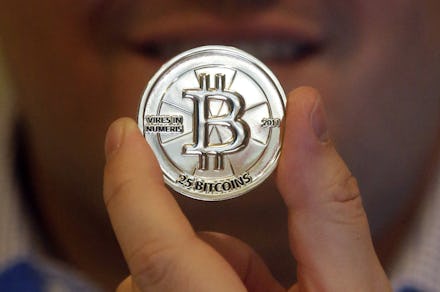Bitcoin ATM Will Either Be a Banking Revolution Or Open Season For Criminals

The world's first bitcoin ATM machine will open for business in Vancouver, British Columbia today. The unit is one of five such machines Canadian firm Bitcoiniacs are expected to roll out across the country in the coming months. Though a U.S. debut is currently not planned, the machines signal a potential sea change in the spread of bitcoin — and the nature of consumer banking.
A seamless exchange between the digital currency and conventional cash reaches what bitcoin proponents hope is an important frontier in the growth of its purchasing power and use. "Our goal is to make bitcoin truly grandma-friendly," said Jordan Kelley, the chief executive of Robocoin, the Nevada firm that manufactures the machines.
His ATM quite possibly achieves that. Convenient access to a user's bitcoin wallet essentially gives the currency the liquidity of government-issued money, with few of the hassles normally associated with a BTC transaction.
Robocoin's ATM is the company's latest effort to smooth out some of the inconveniences encountered in the potentially seedy world of bitcoin. In order to transfer BTC into "fiat currency," holders once had to sell them in unregulated marketplaces, both online and in-person. Though a lack of regulation is one of bitcoin's prime attractions to its staunchest adherents — especially those who, in it, have found refuge from the whims of long-decried central banks — it also presents problems for currency exchange. To mitigate these obstacles, Robocoin opened a brick-and-mortar exchange location in Nevada, and now expands that model with the automated tellers.
The unit looks and, importantly, works like a conventional ATM machine, with the exception of a palm scanner for security. Up to $3,000 CAD may be changed into or from bitcoins, a limit imposed by Canadian anti-money-laundering law.
Preventing laundering is a goal the entrepreneurs share. "We don't want drug dealers sending a bunch of coke to the States and then withdrawing cash," said Bitcoiniacs co-founder Jackson Warren. "We don't want these to turn into money laundering machines; that's the worst thing that could happen."
But it's pretty hard to see how Bitcoiniacs aims to prevent that. Bitcoin has greased the wheels of the internet's demimonde for years now, most notoriously the crypto free-for-all bazaar Silk Road. That site has been taken down by U.S. authorities, but the raids will probably only send future marketplaces further underground. Bitcoin, even when accessed from the safety of Vancouver's Waves Coffee Shop, guarantees anonymity for all of it.
Could today be the first shot in a movement that eventually leads to assassins, drug dealers, and petty thieves lining up in public to quietly cement their ill-gotten cash as off-the-books? Or is bitcoin destined to fulfill the hopes of its most hopeful supporters and supplant the tyranny of central bankers and inflation targets?
Robocoin's ATMs may make bitcoin grandma-friendly, but she may not be around by the time this long story unfolds.